Robert K. Logan | |
|---|---|
| Born | August 31, 1939 |
| Alma mater | Massachusetts Institute of Technology |
| Occupation | Physicist / media ecologist |
Robert K. Logan (born August 31, 1939), originally trained as a physicist, is a media ecologist.
Robert K. Logan | |
|---|---|
| Born | August 31, 1939 |
| Alma mater | Massachusetts Institute of Technology |
| Occupation | Physicist / media ecologist |
Robert K. Logan (born August 31, 1939), originally trained as a physicist, is a media ecologist.
He received from MIT a BS in 1961 and a PhD in 1965 under the supervision of Francis E. Low. After two post-doctoral appointments as a research associate at the University of Illinois at Urbana-Champaign (1965-7) and the University of Toronto (1967-8), he became a physics professor in 1968 at Toronto until his retirement in 2005. He is now professor emeritus. [1] He is a fellow of St. Michael's College, University of Toronto, the Origins Institute at McMaster University and Institute of Biocomplexity and Informatics at the University of Calgary.
While active at the University of Toronto, in addition to math-based physics courses he taught an interdisciplinary course –The Poetry of Physics– which led to his collaboration with Marshall McLuhan, and his research in media ecology and the evolution of language. His best known works are The Alphabet Effect – based on a paper Logan co-authored with McLuhan – which develops the hypothesis that the alphabet, codified law, monotheism, abstract science and deductive logic form an autocatalytic set of ideas that developed uniquely between 2000 BC and 500 BC between the Tigris-Euphrates river system and the Aegean Sea; The Sixth Language: Learning a Living in the Internet Age which deals with the hypothesis that speech, writing, math, science, computing and the Internet form an evolutionary chain of languages; The Extended Mind: The Emergence of Language, the Human Mind and Culture develops a model for the origin of language, the human mind and culture using ideas from The Sixth Language.
Logan has also been chief scientist at Strategic Innovation Lab at OCAD University in Toronto, Ontario since 2007, and a senior fellow at the university's Strategic Innovation Lab (sLab). [2] Part of his work at OCAD involved a language-based project to change popular attitudes about the environment, which resulted in the coining of the word "depletist".
In September 2010, Logan founded the McLuhan Legacy Network, a non-profit organization based in Toronto dedicated to renewing the legacy of Marshall McLuhan and celebrating the centenary of McLuhan's birth in 2011. [3] Logan's work is influenced by Marshall McLuhan, Harold Innis, Alvin Toffler, Stuart Kauffman and Terrence Deacon.
The Sixth Language won the Suzanne K. Langer Award for Outstanding Scholarship in the Ecology of Symbolic Form in 2000 from the Media Ecology Association, [4] and in June 2011 Logan received the Walter J. Ong Award for Career Achievement in Scholarship from the same Association. [5]

Herbert Marshall McLuhan was a Canadian philosopher whose work is among the cornerstones of the study of media theory. He studied at the University of Manitoba and the University of Cambridge. He began his teaching career as a professor of English at several universities in the United States and Canada before moving to the University of Toronto in 1946, where he remained for the rest of his life. He is known as the "father of media studies".

Harold Adams Innis was a Canadian professor of political economy at the University of Toronto and the author of seminal works on media, communication theory, and Canadian economic history. He helped develop the staples thesis, which holds that Canada's culture, political history, and economy have been decisively influenced by the exploitation and export of a series of "staples" such as fur, fish, lumber, wheat, mined metals, and coal. The staple thesis dominated economic history in Canada from the 1930s to 1960s, and continues to be a fundamental part of the Canadian political economic tradition.
Media ecology theory is the study of media, technology, and communication and how they affect human environments. The theoretical concepts were proposed by Marshall McLuhan in 1964, while the term media ecology was first formally introduced by Neil Postman in 1968.
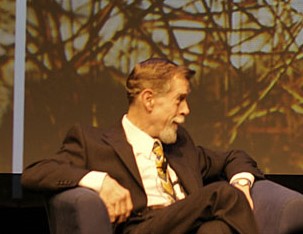
Eric Marshall McLuhan was a communications theorist, son of Marshall McLuhan.

Derrick de Kerckhove is the author of The Skin of Culture and Connected Intelligence and Professor in the Department of French at the University of Toronto, in Toronto, Ontario, Canada. He was the Director of the McLuhan Program in Culture and Technology from 1983 until 2008.

A sensorium (/sɛnˈsɔːrɪəm/) is the apparatus of an organism's perception considered as a whole. It is the "seat of sensation" where it experiences, perceives and interprets the environments within which it lives. The term originally entered English from the Late Latin in the mid-17th century, from the stem sens- ("sense"). In earlier use it referred, in a broader sense, to the brain as the mind's organ. In medical, psychological, and physiological discourse it has come to refer to the total character of the unique and changing sensory environments perceived by individuals. These include the sensation, perception, and interpretation of information about the world around us by using faculties of the mind such as senses, phenomenal and psychological perception, cognition, and intelligence.
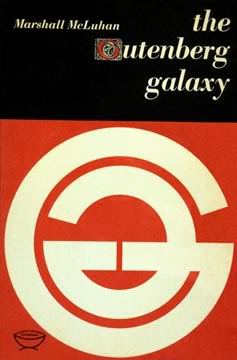
The Gutenberg Galaxy: The Making of Typographic Man is a 1962 book by Marshall McLuhan, in which he analyzes the effects of mass media, especially the printing press, on European culture and human consciousness. It popularized the term global village, which refers to the idea that mass communication allows a village-like mindset to apply to the entire world; and Gutenberg Galaxy, which we may regard today to refer to the accumulated body of recorded works of human art and knowledge, especially books.

Walter Jackson Ong was an American Jesuit priest, professor of English literature, cultural and religious historian, and philosopher. His major interest was in exploring how the transition from orality to literacy influenced culture and changed human consciousness. In 1978 he served as elected president of the Modern Language Association.
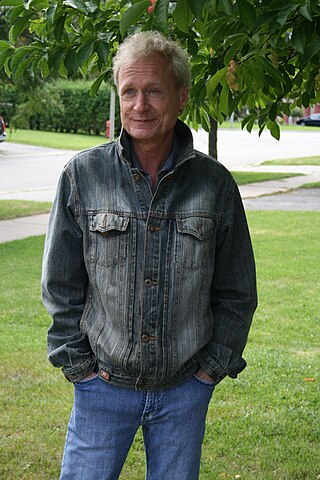
Bruce William Powe, commonly known as B. W. Powe, is a Canadian poet, novelist, essayist, philosopher, and teacher.

Orality is thought and verbal expression in societies where the technologies of literacy are unfamiliar to most of the population. The study of orality is closely allied to the study of oral tradition.

Marshall McLuhan's tetrad of media effects uses a tetrad - a four-part construct - to examine the effects on society of any technology/medium by dividing its effects into four categories and displaying them simultaneously. The tetrad first appeared in print in articles by McLuhan in the journals Technology and Culture (1975) and et cetera (1977). It first appeared in book form in his posthumously-published works Laws of Media (1988) and The Global Village (1989).

Lance A. Strate is an American writer and professor of communication and media studies at Fordham University. He was the 2015 Margaret E. and Paul F. Harron Endowed Chair in Communication at Villanova University, and in 2016 lectured at the School of Journalism and Communication at Henan University, in Kaifeng China.
The alphabet effect is a group of hypotheses in communication theory arguing that phonetic writing, and alphabetic scripts in particular, have served to promote and encourage the cognitive skills of abstraction, analysis, coding, decoding, and classification. Promoters of these hypotheses are associated with the Toronto School of Communication, such as Marshall McLuhan, Harold Innis, Walter Ong, Vilém Flusser and more recently Robert K. Logan; the term "alphabet effect" comes from Logan's 1986 work.
This is a bibliography of Marshall McLuhan's works.
Harley Parker was a Canadian artist, designer, curator, professor and scholar - a frequent collaborator with fellow Canadian and communications theorist Marshall McLuhan.
The Toronto School is a school of thought in communication theory and literary criticism, the principles of which were developed chiefly by scholars at the University of Toronto. It is characterized by exploration of Ancient Greek literature and the theoretical view that communication systems create psychological and social states. The school originated from the works of Eric A. Havelock and Harold Innis in the 1930s, and grew to prominence with the contributions of Edmund Snow Carpenter, Northrop Frye and Marshall McLuhan.
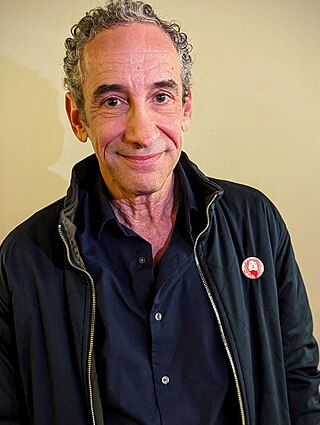
Douglas Mark Rushkoff is an American media theorist, writer, columnist, lecturer, graphic novelist, and documentarian. He is best known for his association with the early cyberpunk culture and his advocacy of open-source solutions to social problems.
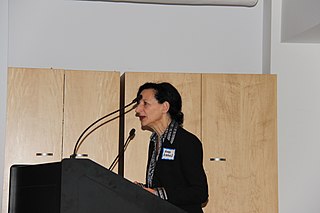
Sara Louise Diamond, is a Canadian artist and was the president of OCAD University, Canada.
Adeena Karasick is a Canadian poet, performance artist, and essayist. Born in Winnipeg of Russian Jewish heritage, she is the distinguished author of 13 books of poetry and poetic theory, as well as a series of parodic videopoems, such as the ironic "I Got a Crush on Osama" that was featured on Fox News and screened at film festivals, Ceci n'est pas un Téléphone or Hooked on Telephonics: A Pata-philophonemic Investigation of the Telephone created for The Media Ecology Association, "Lingual Ladies" a post-modern parody of Beyoncé's "Single Ladies", and "This is Your Final Nitrous" a poetic response to the Burning Man Festival., and White Abbot, a parodic videopoem Karasick created during the writing of Salome: Woman of Valor, dedicated to the impossible anguish of forbidden love.

Viktor Mayer-Schönberger is Professor of Internet Governance and Regulation at the Oxford Internet Institute, University of Oxford. He conducts research into the network economy. Earlier he spent ten years on the faculty of Harvard's John F. Kennedy School of Government. He is the co-author of Big Data: A Revolution That Will Transform How We Live, Work, and Think and author of Delete: The Virtue of Forgetting in the Digital Age, which won the 2010 Marshall McLuhan Award for Outstanding Book and the 2010 Don K. Price Award for Best Book in Science and Technology Politics, and has written over a hundred articles and book chapters. He is a member of Germany's Digital Council, advising Angela Merkel and her cabinet.